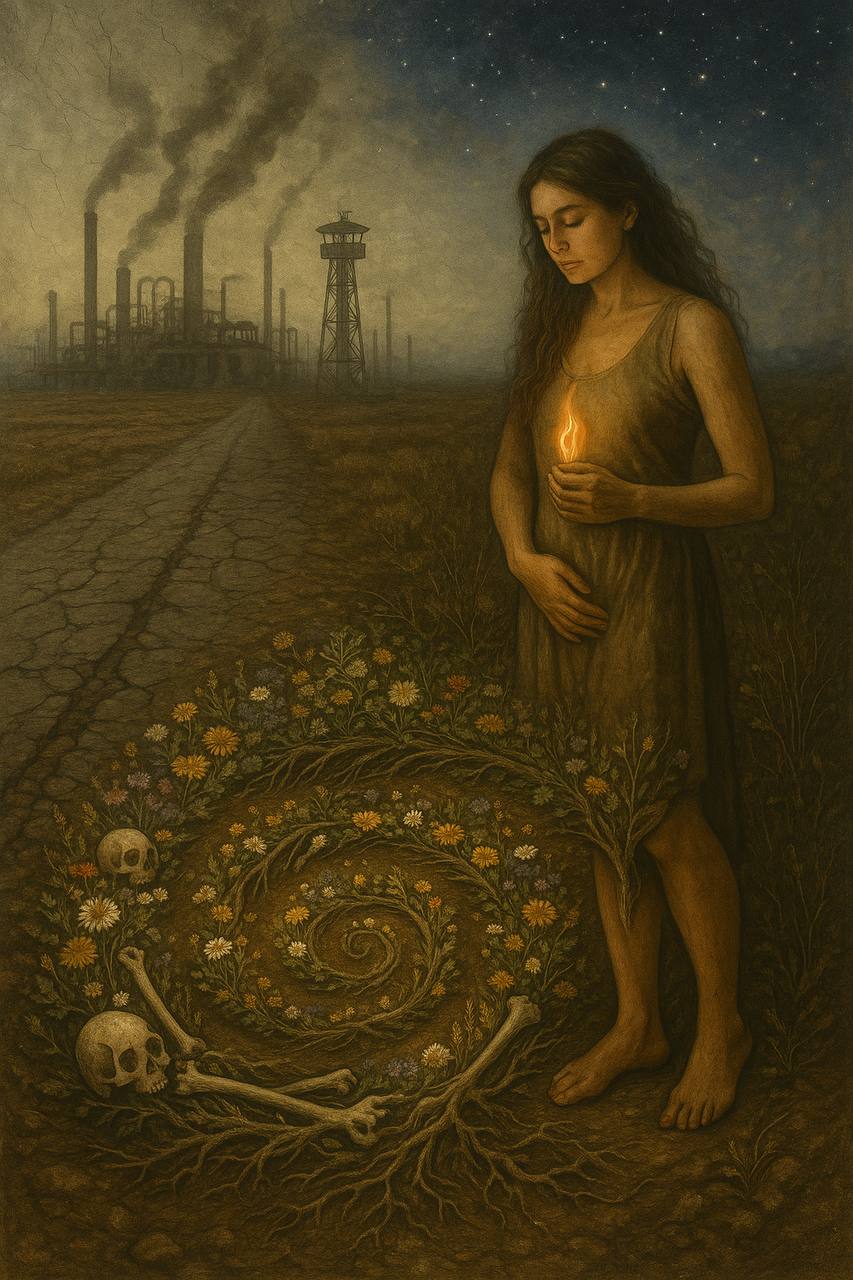Progress as a Civilizational Death March

Introduction: Progress as a Civilizational Death March
They told us there was only one road forward.
Stone by stone, empire by empire, they paved it in the name of light—science, reason, development, growth. They called it progress. They told us it was sacred. That to step off the path was to be lost, to regress, to perish. So we marched.
And we marched.
Over forests, rivers, mountains. Over bodies, cultures, languages. Over women’s knowledge, ancestral memory, soil rhythms. Forward. Always forward. Never still. Never down. Never in.
But what if this path—this glorious, gleaming, upward-bound road—is not leading us to salvation… but to extinction?
What if the myth of progress is not a beacon, but a blindfold? Not a stairway to heaven, but a corridor of collapse?
This essay asks a simple, dangerous question:
What if “progress” is the very mechanism by which civilization dies?
Not all at once. Not with fire and trumpet.
But slowly. Systematically. Through a march that severs body from land, life from time, and motion from meaning.
This is not a metaphor. It is a diagnosis.
Progress, as we’ve been taught it, is a civilizational death march—an ideology dressed as destiny, dragging us past the point of return.
And the first act of healing is to stop walking.
I. The Invention of Progress
Progress did not fall from the sky.
It was built—word by word, brick by brick—by men who believed they had outgrown the Earth.
The idea of linear human advancement, of history as a ladder toward perfection, was not universal. It was a European invention, forged in the crucible of empire and sanctified by the Enlightenment. What had once been mythic and cyclical—time as spiral, rhythm, season—was collapsed into a straight line: forward, upward, better.
At the heart of this rupture was liberal humanism: the belief that the human being (implicitly male, white, rational) stood at the center of the universe, destined to improve himself and the world through reason, technology, and control.
And beneath that? The ghost of Christian eschatology.
The Enlightenment didn’t erase God—it secularized Him.
Where once there was divine salvation at the end of days, now there was human perfectibility at the end of history. The Kingdom of Heaven was rebranded as the technological utopia. Sin became ignorance. Salvation became education and industry. Jesus was replaced by the scientist, the engineer, the economist.
Philosopher John Gray puts it plainly:
“The belief in progress is a secular religion—a superstition in rational drag.”
This is how progress became unquestionable.
It was no longer just a theory of development—it became a moral imperative. Those who lagged behind were not just “undeveloped”—they were backward, sinful, unfit. Those who resisted were heretics to modernity itself.
This framing justified everything:
- The genocide of Indigenous peoples
- The transatlantic slave trade
- The industrial subjugation of land and labor
- The mapping and mining of every square meter of Earth
The world was no longer alive—it was material. The sacred was now “resource.” The future was no longer emerging—it was engineered.
And so we marched forward, believing we were evolving.
But we were only forgetting.
II. Domination in Disguise
Progress wears a mask.
It speaks the language of uplift, advancement, and civilization—but beneath it lies a machinery of domination so refined, it convinces the world that its chains are gifts.
The myth of progress was never innocent. It has always served an agenda: to justify hierarchy, to rationalize conquest, and to erase everything that stands in its path.
1. Colonialism: The Civilizing Alibi
In the age of empire, progress became the holy scripture of colonization.
Europe did not simply extract resources or enslave peoples—it claimed to elevate them. The colonizer arrived not as a thief, but as a teacher. A bringer of light. A bearer of “civilization.”
In this warped theology, the primitive needed saving. The land needed taming. Cultures needed correction. This narrative turned genocide into duty, and cultural erasure into benevolence.
As Frantz Fanon warned, “Colonialism has no future to offer its offspring.” Its only promise was imitation—an endless attempt to catch up to a model that would never accept them.
2. Capitalism: Growth as Virtue
As empires morphed into markets, progress was recoded as growth. Not wisdom. Not well-being. Not balance. Just expansion.
GDP became the altar. Extraction became progress.
The Earth was no longer a home—it was a resource vault. Forests became lumber. Rivers became power. People became labor.
This logic, as Vishwas Satgar writes, marked “the beginning of our end”—the moment when the commons were enclosed and sold back to us as scarcity. It wasn’t advancement. It was the destruction of mutuality, reframed as development.
3. Patriarchy: False Liberation
Even in the name of gender equality, progress betrayed its roots.
Women were promised freedom—so long as it fit the market.
Traditional roles were demeaned. Communal knowledge was erased. Healing, birth, menstruation, and rest were treated as inefficiencies.
Feminist economists, like those in the DAWN network, pointed out the lie: “Development” didn’t liberate women—it pushed them into precarious labor to compensate for systems hollowed by austerity and debt. Progress meant working harder, for less, under the illusion of empowerment.
And still today, women's pain is pathologized while their labor is invisibilized—all in the name of catching up to a system that was never designed to hold them.
Progress, in all its forms, masks a deeper truth:
It has always been a story told by those in power, to preserve power.
It conquers by persuasion. It dominates by narrative.
It doesn’t ask you to resist—it asks you to believe.
And in believing, it asks you to forget: your body, your land, your ancestors, your pace.
III. Cracks in the Myth
Even at the height of modern confidence, some could see the fractures forming.
Beneath the shine of industry, beneath the soaring rhetoric of reason and progress, a few voices began to whisper—then shout—that the whole structure was built on illusion, and that illusion would not hold.
1. Walter Benjamin: The Angel Facing Backward
In his Theses on the Philosophy of History (1940), Walter Benjamin offers an image that slices through centuries of triumphalism:
“A Klee painting named Angelus Novus shows an angel looking as though he is about to move away from something he is fixedly contemplating. His face is turned toward the past… But a storm is blowing from Paradise… This storm irresistibly propels him into the future to which his back is turned, while the pile of debris before him grows skyward. This storm is what we call progress.”
Benjamin saw what others refused to admit:
That “progress” was not clean motion—it was a storm, leaving wreckage behind, dragging us away from what matters.
He flips the whole myth.
Progress is not forward movement—it’s forced forgetting. It moves not with clarity, but with the violent propulsion of denial.
2. The Frankfurt School: Enlightenment Becomes Enslavement
Theodor Adorno and Max Horkheimer, writing in Dialectic of Enlightenment (1947), diagnosed a terrifying turn: the Enlightenment’s promise of emancipation had reversed into its opposite. Reason, instead of freeing humanity, had become a tool of instrumental domination—a logic that reduces everything to use, value, and efficiency.
Culture was not immune.
They coined the term “culture industry” to describe how mass media pacifies the population—not by censorship, but by flooding consciousness with distraction, pleasure, and conformity. Entertainment became anesthesia. Thought was outsourced. The dream of progress became a factory of sameness.
What had been sold as liberation had become a cage.
3. John Gray: A Religion Without a Heaven
Fast forward to the 21st century, and John Gray picks up the thread. In Straw Dogs (2002), he writes:
“The idea of progress is a secular myth, inherited from Christianity, but without the guarantee of redemption.”
In other words: we kept the timeline, the hierarchy, the chosen ones—but stripped away the sacred. What’s left is a machine still running toward an undefined paradise that never arrives.
For Gray, the myth of progress is more dangerous than religion, because it pretends to be neutral. It operates as faith, but disguises itself as fact. And in that lie, it justifies everything.
These thinkers—Benjamin, Adorno, Horkheimer, Gray—come from within the very tradition that birthed the myth.
They were insiders who saw the rot.
They tried to warn us.
And still the march continued.
But their insights remain vital:
Progress is not inherently redemptive.
It has a cost—and that cost is meaning, memory, and life.
IV. Voices of Refusal
While Western critics exposed cracks in the myth of progress, others didn’t just critique it—they refused to participate in it altogether.
These were not just intellectual rejections. They were existential breaks. Decolonial thinkers, Indigenous communities, ecofeminists, and anarchist theorists saw the death march for what it was: not a flawed system, but a civilizational hallucination. And they began to turn away—not backward, but sideways, downward, inward—toward other foundations.
1. Frantz Fanon: Burn the Blueprint
Frantz Fanon, writing at the end of empire, saw the progress myth as a trap for the colonized.
In The Wretched of the Earth (1961), he warns that independence does not mean freedom if it simply mimics the colonial model. A decolonized people who adopt Western modernity wholesale have not escaped—they’ve inherited the sickness.
“The European game has finally ended; we must find something else.”
Fanon called for a New Man—a reborn human no longer defined by colonial trauma, capitalist metrics, or racialized time. He saw that real liberation required a refusal of the master’s tools, including the very concept of progress.
2. Patrick Bond and Vishwas Satgar: Ecocide in Slow Motion
South African thinkers like Patrick Bond and Vishwas Satgar expose how “development” in postcolonial contexts often reproduces the same extractive logics under a new flag.
Satgar writes that colonialism did not simply displace people—it enclosed the commons, shredded ecological balance, and replaced reciprocal cultures with fossil-fueled, state-sanctioned violence.
“The march of colonial conquest was not progress. It was the beginning of our end.”
Bond, meanwhile, tracks how international finance and climate capitalism now sell progress as green growth—a new myth, just as deadly.
3. Buen Vivir: Living Well, Not Growing Fast
From the Andean world comes Buen Vivir—not a theory, but a lived ancestral ethic that refuses both capitalism and state socialism.
Translated as “living well” (not better), Buen Vivir centers community, balance with nature, and spiritual continuity. It rejects the idea that more is always better. It sees the Earth not as a resource, but as a living relative. Progress, in this worldview, is measured not in speed or output, but in relational harmony.
Buen Vivir has even been embedded in the constitutions of Ecuador and Bolivia—an unprecedented challenge to Western developmentalism.
4. Alexander Dunlap: I Don’t Want Your Progress
Radical theorists like Alexander Dunlap take the refusal even further.
In his essay “I Don’t Want Your Progress! It Tries to Kill… Me” (2022), Dunlap ties green capitalism, development aid, and renewable energy mega-projects together as extensions of colonial logic.
His words echo a growing movement—particularly among Indigenous and land defenders—who see not just fossil fuel expansion but all large-scale industrialization as a war on the land, even when it’s labeled “sustainable.”
5. Ecofeminists: Against Fragmentation
Ecofeminists like Vandana Shiva and Maria Mies expose the twin violence of patriarchy and industrial capitalism.
In Ecofeminism (1993), they show how the logic of monoculture—one crop, one economy, one future—is also a violence against women, ecosystems, and plurality itself.
“Progress assumes fragmentation and uniformity as its categories. It destroys the living forces.”
These thinkers argue that modern development does not liberate—it erases. It erases menstrual time, generational knowledge, interdependence. And it replaces them with abstraction, surveillance, and debt.
They do not ask to be included in progress. They ask for its burial.
Across continents and disciplines, these voices converge on one truth:
Progress is not inevitable. It is not neutral. And it is not universal.
It is a choice. And more importantly, it can be un-chosen.
Their refusals are not nihilism. They are acts of fidelity—to Earth, to body, to memory.
They do not seek to fix the death march. They step off the road entirely.
IV. Voices of Refusal
While Western critics exposed cracks in the myth of progress, others didn’t just critique it—they refused to participate in it altogether.
These were not just intellectual rejections. They were existential breaks. Decolonial thinkers, Indigenous communities, ecofeminists, and anarchist theorists saw the death march for what it was: not a flawed system, but a civilizational hallucination. And they began to turn away—not backward, but sideways, downward, inward—toward other foundations.
1. Frantz Fanon: Burn the Blueprint
Frantz Fanon, writing at the end of empire, saw the progress myth as a trap for the colonized.
In The Wretched of the Earth (1961), he warns that independence does not mean freedom if it simply mimics the colonial model. A decolonized people who adopt Western modernity wholesale have not escaped—they’ve inherited the sickness.
“The European game has finally ended; we must find something else.”
Fanon called for a New Man—a reborn human no longer defined by colonial trauma, capitalist metrics, or racialized time. He saw that real liberation required a refusal of the master’s tools, including the very concept of progress.
2. Patrick Bond and Vishwas Satgar: Ecocide in Slow Motion
South African thinkers like Patrick Bond and Vishwas Satgar expose how “development” in postcolonial contexts often reproduces the same extractive logics under a new flag.
Satgar writes that colonialism did not simply displace people—it enclosed the commons, shredded ecological balance, and replaced reciprocal cultures with fossil-fueled, state-sanctioned violence.
“The march of colonial conquest was not progress. It was the beginning of our end.”
Bond, meanwhile, tracks how international finance and climate capitalism now sell progress as green growth—a new myth, just as deadly.
3. Buen Vivir: Living Well, Not Growing Fast
From the Andean world comes Buen Vivir—not a theory, but a lived ancestral ethic that refuses both capitalism and state socialism.
Translated as “living well” (not better), Buen Vivir centers community, balance with nature, and spiritual continuity. It rejects the idea that more is always better. It sees the Earth not as a resource, but as a living relative. Progress, in this worldview, is measured not in speed or output, but in relational harmony.
Buen Vivir has even been embedded in the constitutions of Ecuador and Bolivia—an unprecedented challenge to Western developmentalism.
4. Alexander Dunlap: I Don’t Want Your Progress
Radical theorists like Alexander Dunlap take the refusal even further.
In his essay “I Don’t Want Your Progress! It Tries to Kill… Me” (2022), Dunlap ties green capitalism, development aid, and renewable energy mega-projects together as extensions of colonial logic.
His words echo a growing movement—particularly among Indigenous and land defenders—who see not just fossil fuel expansion but all large-scale industrialization as a war on the land, even when it’s labeled “sustainable.”
5. Ecofeminists: Against Fragmentation
Ecofeminists like Vandana Shiva and Maria Mies expose the twin violence of patriarchy and industrial capitalism.
In Ecofeminism (1993), they show how the logic of monoculture—one crop, one economy, one future—is also a violence against women, ecosystems, and plurality itself.
“Progress assumes fragmentation and uniformity as its categories. It destroys the living forces.”
These thinkers argue that modern development does not liberate—it erases. It erases menstrual time, generational knowledge, interdependence. And it replaces them with abstraction, surveillance, and debt.
They do not ask to be included in progress. They ask for its burial.
Across continents and disciplines, these voices converge on one truth:
Progress is not inevitable. It is not neutral. And it is not universal.
It is a choice. And more importantly, it can be un-chosen.
Their refusals are not nihilism. They are acts of fidelity—to Earth, to body, to memory.
They do not seek to fix the death march. They step off the road entirely.
V. The Somatic and Ecological Cost
The myth of progress does not only colonize land or labor.
It invades the body. It rewires the nervous system. It carves its logic into the ecology of Earth and the architecture of flesh.
What we call “advancement” has come at a cost so deep it often goes unnamed: a fracturing of coherence at every level of life.
1. The Nervous System Under Siege
To live under the spell of progress is to live in dysregulation.
It demands constant acceleration—more productivity, more visibility, more optimization. The body, once guided by rhythm, now obeys the clock.
- Rest becomes laziness.
- Grief becomes pathology.
- Menstruation becomes inconvenience.
- Aging becomes failure.
This is not metaphor. It’s biological dissonance.
Under the progress regime, fight-or-flight becomes baseline.
The parasympathetic nervous system—our access point to healing, dreaming, digesting—atrophies.
Even spirituality becomes a race: toward enlightenment, toward transcendence, toward a version of “awakening” that bypasses the body entirely.
Progress tells us to override the body.
The body, in turn, begins to break.
2. The Earth as Fragmented Organism
Ecologically, the effects are just as violent.
Where once ecosystems were seen as webs, modernity treats them as resource stacks.
Forests become timber. Rivers become kilowatts. Animals become protein units. Soil becomes dirt.
Industrial agriculture, driven by the hunger for growth, destroys microbial diversity, poisons groundwater, and strips the land of its capacity to regenerate.
Monoculture is not just a farming method—it’s a worldview: one crop, one model, one future.
Progress doesn’t just extract—it dis-integrates.
It breaks relationships: between predator and prey, farmer and soil, child and season. It replaces reciprocal systems with inputs and outputs. It creates deserts where there were once living commons.
3. Fractured Time, Fractured Self
At its core, progress imposes mechanical time over somatic time.
Where the Earth turns in circles—sunrise, menstruation, migration, decay—progress flattens time into forward motion. The result is not growth. It is dislocation.
We no longer know when to rest.
We no longer trust when to bleed.
We no longer feel when to stop.
This is not personal failure. This is civilizational trauma—written into endocrine systems, social schedules, and exhausted minds.
It is the trauma of living as if you are a machine, in a body that was made to be an ecosystem.
To critique progress is not just to analyze history.
It is to name a bio-spiritual violence—a splitting of self from soil, rhythm from reason, and life from its own intelligence.
To heal from it, we don’t need more motion.
We need re-integration—of body, land, and time.
VI. Unlearning the March
If progress is a death march, then the most radical act is to stop walking.
To unlearn the march is not passive—it is an act of defiance, grief, and remembering. It is to turn inward when the world demands forward. To lay down when the world demands performance. To spiral when the world demands ascent.
But unlearning is not the same as regression.
It is not about nostalgia. It is not a return to the past.
It is a re-rooting in what was never lost, only covered.
1. Decolonizing Time
We begin with time.
To unlearn the march is to reject chrononormativity—the enforced rhythm of industrial time. It is to remember cyclical time, somatic time, ancestral time.
It is to listen to menstruation as clock. To use seasons as calendar. To track healing not by progress, but by depth, return, coherence.
Time is not a highway.
It is a womb.
2. Walking Differently
We are not called to stillness out of despair. We are called to walk differently.
The spiral is not a metaphor—it is a physics of life. Galaxies spiral. Seeds spiral. Our DNA spirals. The menstrual cycle spirals. Trauma heals in spirals.
To spiral is to move with memory. To move while staying rooted.
This means rejecting linear success. It means making peace with grief, with relapse, with repetition, with rhythms that do not fit productivity apps.
It means making decisions from the body, not the algorithm.
3. Reclaiming the Sacred
Progress replaced the sacred with the efficient.
Unlearning it means reclaiming ritual, prayer, thresholds, and slowness as valid ways of knowing.
To pray with your hands in soil.
To bleed without shame.
To say no, not because it’s strategic, but because it’s true.
This is not anti-modern. It is post-mythic.
Not a return to the old, but a composting of the lie.
4. Collective Deconditioning
You cannot unlearn the march alone.
This work is communal. It requires co-regulation, shared witness, mutual aid, and re-ritualization.
It requires us to decondition our nervous systems not just through information, but through experience: rest, rhythm, ceremony, rupture, and realignment.
We do not need new utopias.
We need old instructions—remembered in new ways.
Unlearning the march does not mean rejecting movement.
It means recovering direction.
Not outward. Not upward.
Inward. Rootward. Earthward.
VII. A New Measure
The end of the line is the beginning of the spiral.
If progress was a line, its endpoint is now visible.
Collapse is no longer theoretical. It’s embodied. Ecological. Emotional.
It’s in the soil, the air, the pulse.
The line has run its course.
And here we are—standing at its frayed edge.
But this is not the end.
This is the place where remembering begins.
1. The Spiral as Return
The spiral is not regress.
It is refinement.
It moves inward, not backward.
It brings us closer to the root, not further from the future.
Spiraling means moving through cycles with memory. It honors death as necessary, grief as sacred, rest as resistance.
It remembers that what matters most often repeats—breath, moon, tide, menstruation, seasons.
The spiral does not hurry.
It listens.
2. A Different Intelligence
The death march taught us to measure worth in speed, growth, and extraction.
The spiral offers different metrics:
- Coherence over control
- Sufficiency over scale
- Regeneration over replication
- Attunement over ambition
What if our success was measured by how rooted we are?
By how much life we support—not how much we extract?
3. The Invitation
The path of progress told us to keep climbing—even as the mountain collapsed beneath us.
But the spiral says:
Lay your ear to the ground. Feel what still lives.
You were never meant to outrun the Earth.
You were meant to belong to her.
Let the line end.
Let the spiral begin.
Let this be your turning point:
Not a fall. Not a failure.
But a return—to breath, to body, to soil, to time.
The world doesn’t need more advancement.
It needs remembrance.
The spiral is waiting.




